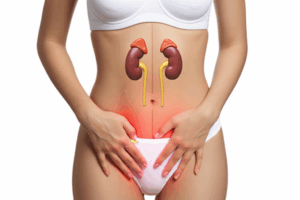Are you under 50 and experiencing persistent abdominal pain or rectal bleeding? These seemingly minor symptoms could be your body’s early warning system for a disease that’s becoming increasingly common among younger adults: colorectal cancer.

Here’s what might surprise you: colon cancer isn’t just an “older person’s disease” anymore. Since the mid-1990s, cases among adults aged 20-39 have been rising by 2% annually, and medical experts are sounding the alarm about this troubling trend.
The Shocking Reality: Colon Cancer in Young Adults Is on the Rise
For decades, colorectal cancer was primarily associated with people over 50. However, recent data reveals a concerning shift that’s catching both patients and healthcare providers off guard.
The numbers tell a stark story:
- Early-onset colorectal cancer (diagnosed before age 50) cases have been steadily increasing for over two decades
- Approximately 50% of early-onset cases occur in people under 45—an age group not routinely screened
- Young adults are more likely to ignore early symptoms, leading to advanced-stage diagnoses
Dr. Yin Cao from Washington University School of Medicine emphasizes the urgency: “Colorectal cancer is no longer a disease of just the older population. For younger adults, we really want to raise awareness that, if you have any of these signs or symptoms, don’t wait to see a doctor.”

5 Critical Warning Signs Young Adults Should Never Ignore
A groundbreaking study published in the Journal of the National Cancer Institute analyzed over 5,000 young adults diagnosed with colorectal cancer and identified four key warning signs that appeared 3 months to 2 years before diagnosis. Here are the 5 critical warning signs every young adult should know:
 Alt text: Medical illustration showing digestive system with highlighted areas indicating potential colon cancer warning signs
Alt text: Medical illustration showing digestive system with highlighted areas indicating potential colon cancer warning signs
1. Persistent Abdominal Pain
What to watch for: Recurring stomach pain that doesn’t seem to have an obvious cause The reality: Abdominal pain was the most common early warning sign, appearing in 11.6% of young adults who developed colorectal cancer compared to only 7.7% of those who didn’t.
Don’t dismiss ongoing stomach discomfort as “just stress” or “something you ate.” If abdominal pain persists for weeks without explanation, it’s time to consult your healthcare provider.
2. Rectal Bleeding
What to watch for: Blood in your stool, on toilet paper, or in the toilet bowl The reality: This symptom had the strongest association with early-onset colorectal cancer diagnosis.
Many young adults mistake rectal bleeding for hemorrhoids—and while hemorrhoids are more common, any unexplained bleeding deserves medical attention. According to recent research, rectal bleeding occurs in 46% of early-onset colorectal cancer cases compared to only 26% of cases in adults over 50.
3. Changes in Bowel Movements (Diarrhea)
What to watch for: Persistent diarrhea lasting more than a few days, or alternating between diarrhea and constipation The reality: Significant changes in bowel frequency, consistency, or appearance can signal underlying colorectal issues.
Your digestive system thrives on routine. When that routine is disrupted for extended periods without an obvious cause (like illness or dietary changes), pay attention.
4. Iron Deficiency Anemia
What to watch for: Unexplained fatigue, weakness, pale skin, or shortness of breath The reality: Iron deficiency anemia can result from chronic, often invisible bleeding in the digestive tract.
Many young adults attribute fatigue to busy lifestyles, but persistent exhaustion combined with other symptoms warrants investigation. A simple blood test can reveal iron deficiency anemia.
5. Unexplained Weight Loss
What to watch for: Losing weight without trying, especially when combined with other symptoms The reality: While not part of the original four warning signs, unexplained weight loss remains a significant red flag for various cancers, including colorectal cancer.
If you’re dropping pounds without changes to diet or exercise, especially alongside other symptoms, don’t celebrate the “easy” weight loss—investigate it.
The Risk Factor Reality Check: Why Young Adults Are More Vulnerable
Experts don’t fully understand why colorectal cancer rates are climbing among younger adults, but several factors likely contribute to this alarming trend:
Lifestyle-Related Risk Factors:
- Sedentary lifestyle: Limited physical activity increases colorectal cancer risk
- Processed food consumption: Diets high in processed meats and low in fiber
- Obesity: Rising obesity rates correlate with increased cancer risk
- Smoking and alcohol: Both habits elevate colorectal cancer risk
Environmental and Other Factors:
- Antibiotic use: May disrupt gut microbiome balance
- Environmental toxins: Exposure to certain chemicals and pollutants
- Chronic inflammation: Conditions like inflammatory bowel disease
According to the Centers for Disease Control and Prevention (CDC), modifiable risk factors play a significant role in colorectal cancer development, making prevention strategies crucial for young adults.

When One Warning Sign Becomes a Medical Emergency
Here’s what the research reveals about multiple warning signs:
- 1 warning sign: 2-fold increased risk of early-onset colorectal cancer
- 2 warning signs: 3-fold increased risk
- 3+ warning signs: 6-fold increased risk
The timing matters too. People with multiple warning signs typically received diagnoses faster:
- 1 sign: median 9.7 months to diagnosis
- 2 signs: median 5.8 months to diagnosis
- 3-4 signs: median 4.8 months to diagnosis
What to Do If You Have Warning Signs
Step 1: Document Your Symptoms
Track when symptoms occur, their severity, and any patterns. This information helps healthcare providers make accurate assessments.
Step 2: Contact Your Primary Care Doctor
Don’t wait for symptoms to worsen. Early intervention leads to better outcomes and less aggressive treatment options.
Step 3: Consider At-Home Screening
Your doctor might recommend a fecal immunochemical test (FIT) or other at-home screening options as an initial step.
Step 4: Request Specialist Referral if Needed
If symptoms persist or multiple warning signs are present, ask for a gastroenterologist referral for further evaluation.
The Life-Saving Importance of Early Detection
The difference between early and late detection in colorectal cancer is literally life-changing:
- Localized stage (caught early): 90% five-year survival rate
- Distant stage (spread to other organs): 14% five-year survival rate
Early detection also means less aggressive treatment, preserving quality of life for younger patients who have decades ahead of them.
Prevention Strategies That Actually Work
While genetics play a role, lifestyle modifications can significantly reduce colorectal cancer risk:
Dietary Changes:
- Increase fiber intake through fruits, vegetables, and whole grains
- Limit processed and red meat consumption
- Choose lean proteins like fish and poultry
Physical Activity:
- Aim for 150 minutes of moderate exercise weekly
- Include strength training exercises
- Reduce sedentary time throughout the day
Lifestyle Modifications:
- Maintain a healthy weight
- Limit alcohol consumption
- Avoid tobacco products
- Manage stress through healthy coping mechanisms
The National Institute of Diabetes and Digestive and Kidney Diseases (NIDDK) provides comprehensive resources on digestive health and cancer prevention strategies.

Breaking the Stigma: Why Young Adults Delay Seeking Help
Many young adults delay medical care for digestive symptoms due to:
- Embarrassment about discussing bowel movements
- Assumption that cancer “only affects older people”
- Busy lifestyles that prioritize work over health
- Fear of medical procedures or costs
Remember: healthcare providers discuss these symptoms daily. There’s no embarrassment in protecting your health.

The Future of Colorectal Cancer Screening
Due to rising early-onset cases, screening guidelines have evolved:
- Previous recommendation: Begin screening at age 50
- Current recommendation: Begin screening at age 45
- Future considerations: Possible earlier screening for high-risk individuals
Researchers continue investigating better methods to identify at-risk young adults, including genetic testing and improved risk assessment tools.
FAQ: Common Questions About Colon Cancer in Young Adults
Q: How common is colon cancer in people under 50? A: While still relatively rare, early-onset colorectal cancer represents about 10-15% of all colorectal cancer cases, with rates continuing to rise annually.
Q: Should I be screened if I have a family history? A: Yes. People with first-degree relatives who had colorectal cancer should begin screening 10 years before the age their relative was diagnosed, or at age 45, whichever is earlier.
Q: Are at-home colon cancer tests reliable for young adults? A: Fecal immunochemical tests (FIT) can detect blood in stool, but they’re not 100% accurate. They’re useful screening tools but shouldn’t replace medical evaluation for persistent symptoms.
Q: What’s the difference between colon and rectal cancer? A: Both are types of colorectal cancer. Colon cancer develops in the large intestine, while rectal cancer occurs in the rectum. Treatment approaches may vary slightly, but warning signs are similar.
Q: Can stress cause colon cancer? A: While chronic stress may contribute to various health issues, there’s no proven direct link between stress and colorectal cancer. However, stress can worsen digestive symptoms and should be managed alongside other risk factors.
Take Action: Your Health Can’t Wait
The rise of colorectal cancer among young adults isn’t just a statistic—it’s a call to action. Your body communicates through symptoms, and ignoring those messages can have serious consequences.
If you’re experiencing any of the warning signs mentioned in this article:
- Schedule an appointment with your primary care doctor within the next two weeks
- Document your symptoms in detail before your appointment
- Don’t let embarrassment prevent you from discussing digestive health
- Advocate for yourself if you feel your concerns aren’t being taken seriously
Remember: catching colorectal cancer early transforms a potentially life-threatening diagnosis into a highly treatable condition. Your future self will thank you for taking action today.
Medical Disclaimer: This article is for educational purposes only and should not replace professional medical advice. Always consult with healthcare providers for personalized medical guidance.
Sources:



